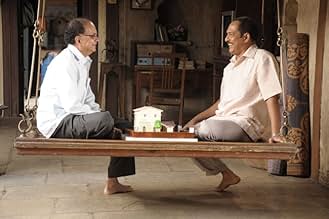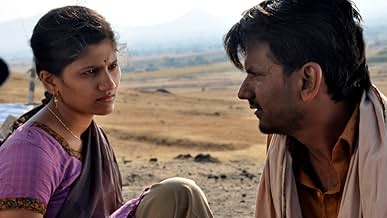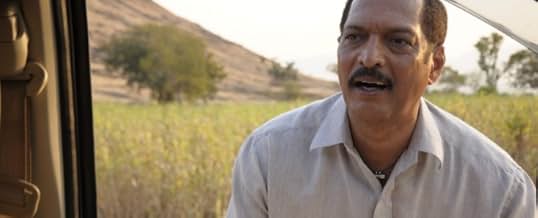IMDb-BEWERTUNG
8,2/10
1806
IHRE BEWERTUNG
Füge eine Handlung in deiner Sprache hinzuKeshya, a simple villager believes that god has arrived in his village but everyone disbelieves him. Later when the politics plays its part things take a drastic change.Keshya, a simple villager believes that god has arrived in his village but everyone disbelieves him. Later when the politics plays its part things take a drastic change.Keshya, a simple villager believes that god has arrived in his village but everyone disbelieves him. Later when the politics plays its part things take a drastic change.
- Regie
- Drehbuch
- Hauptbesetzung
- Auszeichnungen
- 3 wins total
Dilip Prabhawalkar
- Anna Kulkarni
- (as Dilip Prabhavalkar)
Empfohlene Bewertungen
I am a non maharastrian, but after staying here for 4-5 years, I started understanding marathi. I heard a lot from my colleagues about this movie. Then I decided to watch this movie. When I saw this movie, I was completely surprised with everything. Story, Story-telling, direction, acting and what not. Nana Patekar, Sonali Kulkarni, they are as usual superb actors. But it was Girish Kulkarni who clicked me. What an actor he is. I would never miss any of his future movies.
Overall, the bollywood movie makers should learn movie making and that to be without macho heros.
Excellent Job Team Deool.
Overall, the bollywood movie makers should learn movie making and that to be without macho heros.
Excellent Job Team Deool.
Being an indian and maharashtrian person brought up surrounded by such religiious places I can totally relate myself to this story. The way Umesh has displayed his perspective definitely syncs with me.
Perfect vision of how religion has become a business and how they play with people's mind.
Must watch for people who are blindly religious
I had bookmarked Deool on Primevideo. Got around to watching it last night in orig. Marathi w/Eng. Subs.
Deool deserves to be ranked as a Marathi film political classic, ahead of its time. The stellar cast and in fact every actor deliver their respective characters as though to the manor born.
A nondescript village (Mangrul) in what looks very much like a sweeping Satara-esque landscape albeit overgrazed and barren, is the location for this film.
A scruffy looking young man Keshya (Girish Kulkarni) on the lookout for his cow Karde, rests in the shade of a solitary tree. He is startled out of his sleepy reverie with a vision of the three headed Lord Dattatreya. Convinced that it is for real, Keshya races back to his village to announce his revelation. Some in the village are convinced, others take a more rational approach such as the respected Anna (Dilip Prabhavalkar) who assures Keshya that his faith may well have allowed him a vision of his God but it would be better to be quiet about it. The local politician Bhau (Nana Patekar) is encouraged by his MLA boss (Mohan Agashe) to seize this opportunity and make hay while the sun shines. Bhau aided by his supporters - a motley bunch of typical local characters superbly essayed by their respective actors , the lady sarpanch, Bhau's wife, Keshya's girlfriend, the village bhajan mandal and most others, make political and economic capital by building a fancy temple to Lord Dattatreya on the hillock next to the tree where Keshya had his vision, with a special enclosure for the 'holy cow' Karde. They auction the stalls lining the now well paved path to the temple. To cut a long story short, the temple is profitably commercialised; the entire village 'develops' and prospers, making a lot of money with an endless stream of pilgrims coming from far and wide. Mangrul has indeed arrived as a "Sacred" place on the pilgrimage circuit.
The idealistic Anna is disappointed as Bhau chose the temple for political gain instead of the promised hospital project and leaves the village for good. Mohan Agashe and Bhau rise politically. One day, Karde the cow falls ill and soon passes away. Keshya is heartbroken, inconsolable and disillusioned. He steals the idol of Dattatreya and runs away from the village, immersing his God in a far off river before returning home. Nasiruddin Shah appears in a blink and miss moment as a North Indian dacoit taking momentary refuge in some archaeological ruins on the outskirts of Mangrul. He is grateful to Keshya for giving him water.
The last frames show the hugely successful politicians and their supporters leading a huge crowd of pilgrims on a march to the top of the hillock and installing a new flashy idol of Lord Dattatreya .......
The characters are quite real, the story very convincing as indeed several such examples of commercially profitable Sacred places all over India reveal. The shrewd political sub plot is well played, as are the various relationships.
The movie is slow in parts, but other than that it is a well crafted film and deserves much wider publicity with multi language subtitling.
Deool deserves to be ranked as a Marathi film political classic, ahead of its time. The stellar cast and in fact every actor deliver their respective characters as though to the manor born.
A nondescript village (Mangrul) in what looks very much like a sweeping Satara-esque landscape albeit overgrazed and barren, is the location for this film.
A scruffy looking young man Keshya (Girish Kulkarni) on the lookout for his cow Karde, rests in the shade of a solitary tree. He is startled out of his sleepy reverie with a vision of the three headed Lord Dattatreya. Convinced that it is for real, Keshya races back to his village to announce his revelation. Some in the village are convinced, others take a more rational approach such as the respected Anna (Dilip Prabhavalkar) who assures Keshya that his faith may well have allowed him a vision of his God but it would be better to be quiet about it. The local politician Bhau (Nana Patekar) is encouraged by his MLA boss (Mohan Agashe) to seize this opportunity and make hay while the sun shines. Bhau aided by his supporters - a motley bunch of typical local characters superbly essayed by their respective actors , the lady sarpanch, Bhau's wife, Keshya's girlfriend, the village bhajan mandal and most others, make political and economic capital by building a fancy temple to Lord Dattatreya on the hillock next to the tree where Keshya had his vision, with a special enclosure for the 'holy cow' Karde. They auction the stalls lining the now well paved path to the temple. To cut a long story short, the temple is profitably commercialised; the entire village 'develops' and prospers, making a lot of money with an endless stream of pilgrims coming from far and wide. Mangrul has indeed arrived as a "Sacred" place on the pilgrimage circuit.
The idealistic Anna is disappointed as Bhau chose the temple for political gain instead of the promised hospital project and leaves the village for good. Mohan Agashe and Bhau rise politically. One day, Karde the cow falls ill and soon passes away. Keshya is heartbroken, inconsolable and disillusioned. He steals the idol of Dattatreya and runs away from the village, immersing his God in a far off river before returning home. Nasiruddin Shah appears in a blink and miss moment as a North Indian dacoit taking momentary refuge in some archaeological ruins on the outskirts of Mangrul. He is grateful to Keshya for giving him water.
The last frames show the hugely successful politicians and their supporters leading a huge crowd of pilgrims on a march to the top of the hillock and installing a new flashy idol of Lord Dattatreya .......
The characters are quite real, the story very convincing as indeed several such examples of commercially profitable Sacred places all over India reveal. The shrewd political sub plot is well played, as are the various relationships.
The movie is slow in parts, but other than that it is a well crafted film and deserves much wider publicity with multi language subtitling.
10JvH48
I saw this film as part of the Rotterdam Film Festival 2012. A central theme is what happens when commercialization and politics lay their mostly self serving hands on a religious event. The story opens with the alleged manifestation of a God figure, experienced by a young villager while lying asleep under a tree. He ignores friendly advice to keep it for himself, and a journalist becomes aware of the event. After that it all gets out of control. A temple is built, notwithstanding several wise men insisting that there are better ways to spend the building costs. More and more tourists visit the place. A holy city grows in the middle of the desert, totally overwhelming the once peaceful village.
We observe all this happening as a stepwise process. Clearly, most people take advantage of the growing prosperity, and prefer to ignore the negative side effects. They even conveniently forget that is was God who it was all about. All characters appearing in this film seem true to themselves, and behave natural in their assumed roles. Authenticity as it should be.
Ingenious script, and it works well for the whole 135 minutes running time. The film was never boring, in spite of its relatively slow pace. The latter blends in with the environment, as we see the villagers never do very much, and they seem to enjoy their uncomplicated lives. Also adding to my positive experience was that we hear wonderful music from time to time, that makes very good listening even to our European ears. And last but not least I admired the nice landscapes we get to see.
I don't think it is useful to summarize all characters and their relationships here. You see them appear at appropriate moments, without overwhelming the viewer, regardless of their vast number. The core theme is very obvious: the commercialization of religion in combination with how an insignificant event gets hijacked by politicians. Everyone seems to grow and prosper as a result, so who cares?
Finally, I'm not sure I understood the (hidden?) meaning of the final scene. We see a looter, visibly wounded, approach from a distance. In my opinion it suggests a 2nd coming. Maybe someone to clean out the whole godless mess that the village had become. But I'm speculating now.
We observe all this happening as a stepwise process. Clearly, most people take advantage of the growing prosperity, and prefer to ignore the negative side effects. They even conveniently forget that is was God who it was all about. All characters appearing in this film seem true to themselves, and behave natural in their assumed roles. Authenticity as it should be.
Ingenious script, and it works well for the whole 135 minutes running time. The film was never boring, in spite of its relatively slow pace. The latter blends in with the environment, as we see the villagers never do very much, and they seem to enjoy their uncomplicated lives. Also adding to my positive experience was that we hear wonderful music from time to time, that makes very good listening even to our European ears. And last but not least I admired the nice landscapes we get to see.
I don't think it is useful to summarize all characters and their relationships here. You see them appear at appropriate moments, without overwhelming the viewer, regardless of their vast number. The core theme is very obvious: the commercialization of religion in combination with how an insignificant event gets hijacked by politicians. Everyone seems to grow and prosper as a result, so who cares?
Finally, I'm not sure I understood the (hidden?) meaning of the final scene. We see a looter, visibly wounded, approach from a distance. In my opinion it suggests a 2nd coming. Maybe someone to clean out the whole godless mess that the village had become. But I'm speculating now.
Everything about this movie dialogues, lifestyle, songs is a classic timepiece in itself. Well thought and researched play with perfect casting. Not the one to miss.
Wusstest du schon
- WissenswertesBefore the temple is constructed Nana Patekar has a Mahindra Bolero (MUV) where in the numbers as disguised as "Bhau" in Marathi. After the village becomes prosperous he upgrades to Mahindra Scorpio (SUV) with the same number plate.
Top-Auswahl
Melde dich zum Bewerten an und greife auf die Watchlist für personalisierte Empfehlungen zu.
- How long is Deool?Powered by Alexa
Details
Box Office
- Budget
- 47.500.000 ₹ (geschätzt)
- Laufzeit2 Stunden 15 Minuten
- Farbe
Zu dieser Seite beitragen
Bearbeitung vorschlagen oder fehlenden Inhalt hinzufügen
































